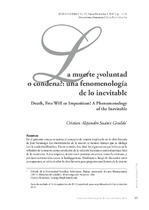La muerte ¿voluntad o condena?: una fenomenología de lo inevitable

View/
Date
2012xmlui.dri2xhtml.METS-1.0.item-type
article
Citación
Metadata
Show full item recordDocuments PDF
Abstract
En el presente ensayo se rastrea el concepto de muerte implicado en la obra literaria de José Saramago Las intermitencias de la muerte, al mismo tiempo que se dialoga con la tradición filosófica. En ese sentido, ésta dará los argumentos que bifurcarán la reflexión de la muerte como condición de la volición humana o como desenlace fatal de la existencia. A este respecto, intervienen posturas creyentes, como la cristiana, y posturas existenciales, como la heideggeriana. Finalmente, luego de abarcados estos presupuestos, se volverá sobre la obra literaria para proponer una lectura de la muerte como una fenomenología de lo inevitable, en donde la evidente relación entre el vivir y el morir definirá la posibilidad de plantear una ética y una antropología desde la aceptación de dicha condición existencial. The following paper analyzes the concept of death in José Saramago’s work Death with Interruptions and, at the same time, it establishes a dialogue with the philosophical tradition. The last one will provide elements to orientate the reflection on death in two directions: as a condition of human will or as a fatal ending of existence. In this regard, we should consider both the believer and the existentialist perspectives, such as the Christian and Heideggerian ones. After having analyzed those perspectives, the literary work will be considered once again in order to propose a reading of death as a phenomenology of the inevitable, in which the relation between living and dying will establish the possibility of setting out an ethical and anthropological proposal from the perspective of accepting such an existential condition.
Keyword/s
José Saramago
Muerte
Existencia
Tradición filosófica
Fenomenología
Death
Existence
Philosophical Tradition
Phenomenology
Collections
- No. 9 (2012) [11]
The following license files are associated with this item:

